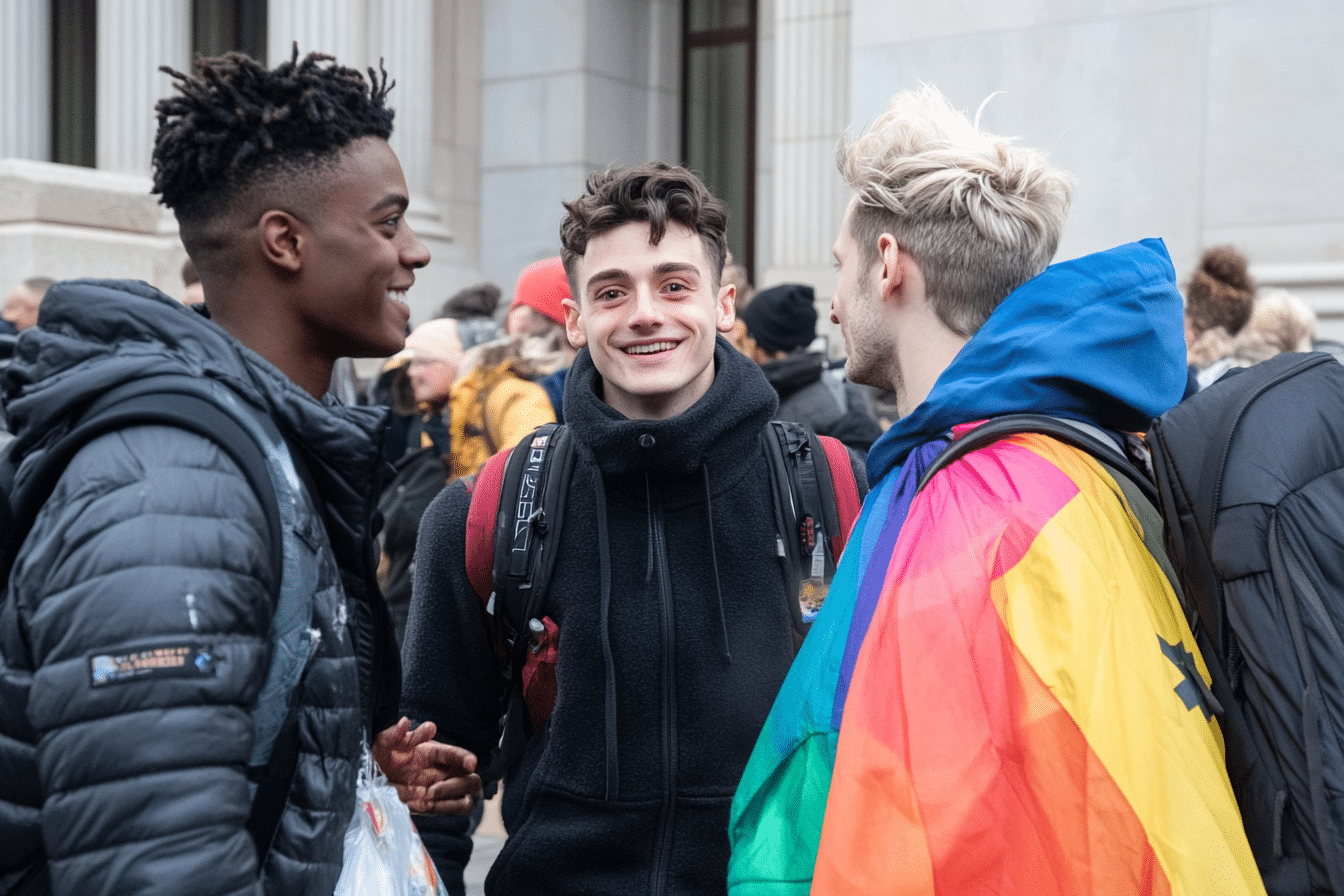Finding Support: Best Gay Therapy DC for Individuals and Couples
Searching for gay therapy DC? This guide helps you find LGBTQ+ affirming therapies in Washington, DC. Learn about mental health support, relationship counseling, and the resources you can access to find a qualified therapist.
Key Takeaways
- Gay therapy in DC is essential for LGBTQ+ individuals, providing a safe space to address mental health challenges caused by societal discrimination.
- Therapists offer specialized services for various issues, including relationship counseling for same-sex and mixed-orientation couples, along with strategies to navigate intimacy and communication.
- Ongoing training and community support enhance therapists’ ability to serve LGBTQ+ clients effectively, fostering personal growth and self-acceptance while addressing unique mental health needs.
Understanding Gay Therapy in Washington, DC
Gay therapy is vital for LGBTQ+ individuals to tackle mental health challenges arising from societal discrimination. Stigma and social isolation can severely affect their well-being, making therapy a crucial resource for coping and thriving. In Washington, DC, LGBTQ therapy services provide a safe and supportive environment where clients feel understood and accepted, allowing them to openly discuss their feelings and experiences.
Therapy usually starts with an initial session to discuss the client’s needs and next steps. This meeting is key for building trust and understanding between the client and the therapist. Through these sessions, individuals can explore their sexual orientations, relationships, and personal challenges in a non-judgmental space.
Washington, DC, offers a range of gay therapist specialists in LGBTQ+ affirming therapy, ensuring clients can find professionals who truly understand their experiences. This fosters effective and empathetic therapeutic relationships, addressing unique mental health concerns within the LGBTQ+ community.
Why LGBTQ+ Therapy Matters in DC: Washington, DC, is a vibrant city that celebrates diversity, but it’s also a place where the pressures of professional life and societal expectations can weigh heavily on the LGBTQ+ community. Affirming therapy offers a safe space to navigate these challenges, fostering resilience and deeper connections in a city where inclusivity should thrive. For more insights, you can explore tips to support LGBTQ+ mental health.
Services Offered by Gay Therapists in DC
In Washington, DC, gay therapists provide services for various mental health issues, including:
- bipolar disorder
- depression
- anxiety
- PTSD
- substance abuse
They use compassionate, evidence-based approaches in individual counseling sessions to help clients manage their mental health. Matching clients with therapists ensures a comfortable and tailored experience, promoting better outcomes.
Specialized couples therapy is available for same-sex partnerships, mixed-orientation relationships, and polyamorous arrangements. Experts in relationship counseling provide advanced treatment options to address common challenges, focusing on promoting connection, improving communication, and resolving conflicts within therapy sessions. Whether it’s enhancing intimacy or navigating complex relationship dynamics, gay couples counseling helps gay couples build stronger, more fulfilling relationships.
Therapists also work with diverse partnerships, including gay and mixed-orientation marriages. Addressing intimacy barriers and fostering better understanding can significantly enhance relationship satisfaction and overall well-being, as these couples often face unique challenges.
Specialized Training for LGBTQ Affirming Therapy
Specialized training equips mental health professionals to provide effective LGBTQ affirming therapy. Modules cover mental health disparities, trauma-informed care, and challenges faced by LGBTQ youth. LGBTQ+ 101 Training offers essential knowledge for culturally competent treatment.
Therapists can earn continuing education credits through LGBTQ+ health equity training programs, emphasizing ongoing professional development. These programs provide insights into creating affirming environments, enhancing therapists’ ability to serve the LGBTQ+ population effectively.
Cultural competence training enhances therapists’ understanding of relevant terminology and disparities faced by LGBTQ clients. Improved communication and addressing unique needs enable therapists to provide personalized, effective care, ensuring clients feel seen and supported.
Navigating Relationship Issues
Therapy often enhances communication, reducing conflict and fostering understanding among partners. LGBTQ+ couples frequently face challenges with sexual and emotional intimacy, often stemming from past experiences. Therapy provides tools to overcome intimacy avoidance and improve relationship satisfaction.
Therapy promotes emotional closeness and connection, helping couples navigate their relationship issues more effectively.
Addressing Minority Stress and Discrimination
Minority stress from stigma and discrimination significantly contributes to mental health disparities in the LGBTQ+ community, leading to heightened anxiety and depression. Anticipated discrimination further increases anxiety and hypervigilance, impacting emotional well-being. Therapy helps LGBTQ+ individuals develop coping strategies to manage societal discrimination and personal challenges.
Therapists use a trauma-informed approach to address the effects of discrimination and minority stress on mental health. Supportive environments can mitigate the negative impacts of minority stress on LGBTQ+ individuals.
Therapy helps clients replace harsh self-criticism with supportive self-talk, fostering self-esteem and confidence.
Support for Gender Identity and Expression
LGBTQ+ therapy offers a safe space for individuals to discuss their identities and relationship dynamics. Therapists support concerns like self-acceptance, gender exploration, and family dynamics, crucial for those exploring their gender identity and affirming their true selves.
Navigating social and medical transitions can be challenging for transgender and nonbinary individuals. Therapy offers guidance and support, helping manage the emotional and practical aspects of transitions, including coming out or affirming gender identity.
Gender identity can be expressed through choices in clothing and grooming. Inclusive practices in therapy, like using preferred pronouns and avoiding gender-based assumptions, create a supportive and affirming environment that acknowledges diverse gender identities.
Substance Abuse and Mental Health Concerns
LGBT individuals are more likely to face mental health issues and substance use disorders than their heterosexual peers. Therapy helps assess substance use and promote health by focusing on strengths and treating root causes, ensuring comprehensive care that addresses unique needs.
Residential treatment facilities are more likely to provide LGBT-specific services than inpatient treatments. Notably, 17.6% of substance abuse facilities offer programs tailored for LGBT clients. Private for-profit facilities are more likely to provide LGBT-specific treatment programs compared to public or nonprofit facilities.
Personal Growth and Self-Esteem
Therapy helps individuals facing sexual orientation challenges live a fulfilling life. The focus is on setting goals and addressing obstacles to healing and growth, leading to increased emotional intelligence and a more vibrant life experience.
Clients often report personal growth, improved self-esteem, and the ability to lead more fulfilling lives after therapy. Building resilience and fostering self-acceptance are key outcomes of the therapeutic journey.
Choosing the Right Therapist
Choosing the right therapist is vital for effective therapy and personal growth. Clients should inquire about a clinician’s background and training to ensure they are qualified. Understanding the therapist’s educational background and preferred treatment approaches can help gauge compatibility.
Prospective clients should also inquire about the therapist’s expertise with LGBTQ-specific challenges. Scheduling a consultation might involve browsing staff bios or providing contact information for a counselor match. Finding a good fit ensures clients feel comfortable and supported.
Online Therapy Options in DC
Research shows that online therapy is as effective as traditional in-person sessions for individuals and couples. Clients can use secure video conferencing without software installations, allowing convenient access to therapy from their homes in the DC metro area.
Online therapy offers guidance for self-awareness and healing, providing valuable advice for relationships and life. Whether seeking therapy for personal growth, dealing with relationship issues, or navigating mental health concerns, online options provide accessible support. Dealing with relationship issues can be challenging, but online therapy provides a flexible and convenient way to receive support.
Community Support and Resources
Community support is vital for the well-being of LGBTQ+ individuals, offering safe spaces and understanding that enhance mental health. In Washington, DC, various organizations provide LGBTQ+ mental health resources, including community centers and counseling services, helping individuals feel connected and supported within the queer community.
Therapeutic services include individual counseling, couples therapy, and group therapy specifically designed for LGBTQ+ challenges. Online therapy options are also available, providing flexible support in the DC metro area.
Summary
As we have explored, LGBTQ+ therapy in Washington, DC, offers a comprehensive range of services to address the unique challenges faced by the queer community. From specialized training for therapists to support for gender identity and expression, the resources available are designed to foster personal growth, enhance relationships, and improve overall mental health.
The journey towards mental well-being and self-acceptance is deeply personal, and finding the right support can make all the difference. Whether you are seeking therapy for personal growth, navigating relationship issues, or addressing mental health concerns, the LGBTQ+ affirming therapy services in Washington, DC, are here to help. Take the first step towards a more fulfilling life by reaching out for the support you deserve.
At The Therapy Group of DC, we’re committed to providing LGBTQ+ affirming therapy that honors your identity and helps you thrive. Our team of experienced therapists is here to support your mental health, relationships, and personal growth. Reach out today to take the first step toward living a more fulfilling life.
Frequently Asked Questions
What is LGBTQ-affirming therapy?
LGBTQ-affirming therapy is all about creating a safe space where LGBTQ+ individuals can feel understood and supported as they navigate their unique challenges. It encourages personal growth while honoring their identities.
How can therapy help with relationship issues for LGBTQ+ couples?
Therapy can significantly help LGBTQ+ couples by improving communication, resolving conflicts, and enhancing intimacy, making it easier to navigate their unique challenges. It’s a supportive way to build a healthier relationship together.
What types of support are available for gender identity and expression in therapy?
Therapy provides valuable support for exploring your gender identity, fostering self-acceptance, and navigating family dynamics and transition processes. It’s a safe space to discuss your feelings and experiences, tailored to your unique journey.
Is online therapy as effective as in-person sessions?
Absolutely, online therapy has been shown to be just as effective as in-person sessions, offering you a flexible and convenient way to access support when you need it.
How do I choose the right therapist for LGBTQ-affirming therapy?
Choosing the right therapist involves asking about their experience with LGBTQ issues and setting up a consultation to see if you click. A good fit will make your therapy journey more comfortable and affirming.


